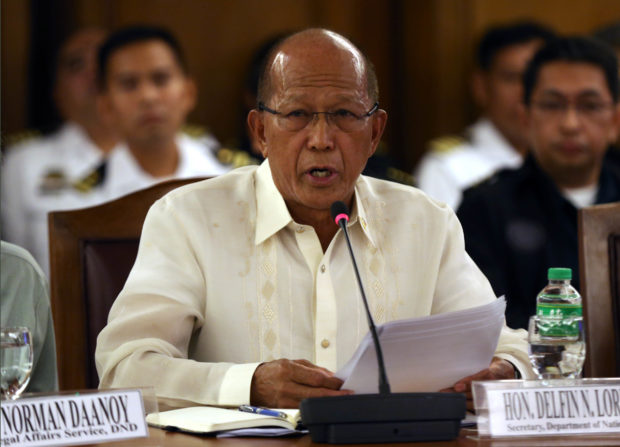Military doubts Red stand-down
The defense chief and an Army general on Thursday expressed doubt communist rebels would respect any ceasefire ahead of the resumption of peace negotiations with the government.
Defense Secretary Delfin Lorenzana and Maj. Gen. Rhoderick Parayno, commander of the 2nd Infantry Division, were reacting separately to an Inquirer report that the military and the New People’s Army (NPA) may cease hostilities as early as next week under a preliminary truce proposed by government and rebel negotiators.
Speaking to reporters on the sidelines of an Air Force forum at Camp Aguinaldo on Thursday, Lorenzana said the military might be the only party that would stand down under an agreement being finalized in back-channel talks between negotiators from the government and the communist-led National Democratic Front of the Philippines (NDFP).
‘Cease operations’
“What does stand down mean [to communist rebels] anyway? We might stand down but they wouldn’t,” he said.
Article continues after this advertisementLorenzana said the defense establishment still had to consult government peace negotiators before standing down.
Article continues after this advertisement“Stand down means cease operations. Stand down for them might mean there would be no attacks but we suspect they will continue their recruitment. They also have to stop that if there is a stand-down,” Lorenzana said.
Stepped-up expansion
He said rebel documents indicated that the insurgents were “actually intensifying their expansion of their areas.”
Although the military was doubtful about the rebels’ sincerity, Parayno told the Inquirer in Lucena City that he was hopeful that the NPA would abide by any form of ceasefire agreed by both sides.
“Apprehension is always there. The question of sincerity will always be there because of our past experiences,” he said.
Cautious
“We have to be cautious,” he added. “But we are hopeful, hoping this time they’ll mean what they say.”
The stand-down agreement, which would require both sides to suspend offensive operations against each other, was “meant to stimulate the atmosphere for peace negotiation two weeks before the resumption of the peace talks,” according to Jose Maria Sison, founding chair of the Communist Party of the Philippines (CPP).
Back-channel talks
Sison, who serves as chief political consultant to the NDFP in the talks brokered by the Norwegian government, on Wednesday told the Inquirer that the stand-down order could be issued to government and rebel forces as early as June 14, two weeks before the resumption of the peace talks and a formal bilateral ceasefire.
President Duterte’s peace adviser, Jesus Dureza, was surprised that Sison had disclosed what had been discussed in the back-channel talks and said the date for the start of the stand-down was an “old agreed timeline.”
“Hopefully by the end of the month there will be a formal resumption [of negotiations], if things turn out right. But it depends on the outcome of the back-channel talks,” Dureza told reporters on Thursday on the sidelines of a forum on federalism and the proposed Bangsamoro Basic Law.
‘Latest suggestion’
He said he welcomed Sison’s announcement of the planned resumption of the talks “because it shows there’s an enabling environment that will enable us to continue the negotiations.”
On Thursday, however, Sison told the Inquirer in an online interview that the “latest suggestion” from the government was to postpone the implementation of the stand-down for a week, which would mean also resetting the dates for resuming formal talks and the ceasefire.
He said the government peace panel needed time “to effect the removal of hindrances to the participation” of six NDFP consultants in the talks in the Netherlands.
NDFP consultants
The NDFP wants the government to allow the six consultants—Benito Tiamzon, Rafael Baylosis, Alan Jazmines, Adelberto Silva, Vicente Ladlad and Randall Echanis—to travel to the Netherlands.
Jazmines, who is detained at Camp Bagong Diwa, was allowed to leave by the Regional Trial Court of Taguig City.
Baylosis was arrested on charges of illegal possession of firearms two months after Mr. Duterte canceled the talks.
Mr. Duterte had promised to end the nearly 50-year Maoist insurgency through a negotiated settlement but he abandoned the peace efforts last November, complaining of repeated rebel attacks.
His administration later petitioned a court to declare the CPP and the NPA terrorist organizations. It also sought to declare about 600 people, including about two dozen rebel consultants, terrorists.
In April, Mr. Duterte told the government panel to restart the talks. —WITH REPORTS FROM DONA Z. PAZZIBUGAN AND MATTHEW REYSIO-CRUZ
